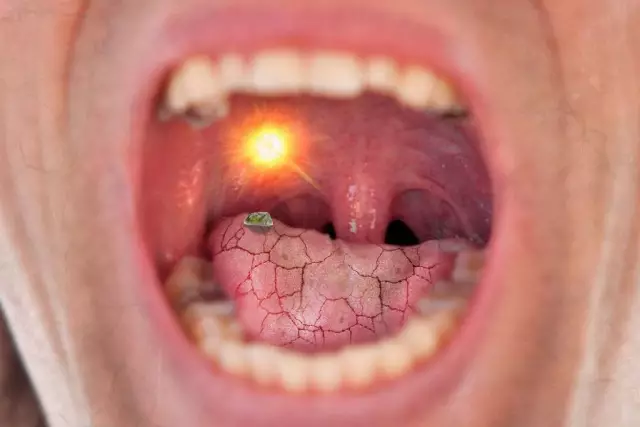- Author Curtis Blomfield [email protected].
- Public 2023-12-16 20:44.
- Last modified 2025-01-23 17:01.
Saliva moisturizes and cleanses the oral cavity, thereby preventing the development of bacterial and fungal infections. When the body does not produce enough saliva, a person begins to experience very unpleasant sensations, which doctors call xerostomia. In simple words, this is an unhe althy condition when a person has constant or intermittent dry mouth. If the cause of xerostomia is not detected in time, it can bring various inconveniences to a person's daily life - bad breath, problems with speech and swallowing. Oral diseases such as dental caries, gingivitis (inflammation of the gums) and candidiasis (oral thrush) often accompany a lack of salivation.

SYMPTOMS OF XEROSTOMIA
Unhe althy dry mouth is most often characterized by the following symptoms:
1. A person is almost always thirsty.
2. The lips are cracked, the mouth and throat are very dry, and the tongue is covered with a sticky coating.
3. Small abscesses and sores form in the mouth, corners of the lips and on the tongue.
4. There is a slight burning sensation in the mouth.
5. It becomes difficult to chew foodswallow and even talk.
6. Bad breath from the mouth that neither mint paste nor chewing gum can cure.
WHY DRY MOUTH?
Unhe althy dry mouth can result from:

1. A side effect of painkillers and heavy medications that are used in the treatment of depression, allergies, epilepsy, diarrhea, asthma and a number of other diseases. This includes some sedatives and muscle relaxers.
2. The development of any disease or infection (Sjögren's syndrome, HIV, AIDS, diabetes, anemia, hypertension, stroke, mumps, Parkinson's and Alzheimer's).
3. Medical intervention (salivary gland removal or chemotherapy).
4. Damage to nerve tissue.
5. Abuse of tobacco products.
6. Dehydration due to profuse sweating, vomiting, diarrhea, blood loss and burns.
WHAT TO DO IF YOUR MOUTH IS DRY?
If you are sure that your dry mouth is caused by medications or diseases, it is best to see a doctor. If everything is not so deplorable, then you can try to independently eliminate the cause of the fact that the mouth dries. To restore he althy salivation, you need:

1. Eat more unsweetened fruit or chew sugar-free gum.
2. Drink plenty of water to keep your mouth moist.
3. Breathe through your nose if possible.
4. Do not abuse s alty, sweet and dry foods (crackers, cookies,croutons, dried fruits).
5. Use artificial solutions that replace natural saliva. Most of them can be bought at any major pharmacy without a doctor's prescription.
6. Reduce coffee, alcoholic beverages, and high acid fruit juices (apple, orange, grape, grapefruit, tomato) whenever possible.
7. Use a gentle toothpaste and rinse your mouth with clean water or a mild solution of s alt and baking soda before and after each meal.
Some experts recommend using toothpastes and mouthwashes containing fluoride. However, in recent years, the question has often been raised that this substance does more harm to teeth than good. Therefore, it will never be superfluous to consult a dentist about the correct treatment of xerostomia.






